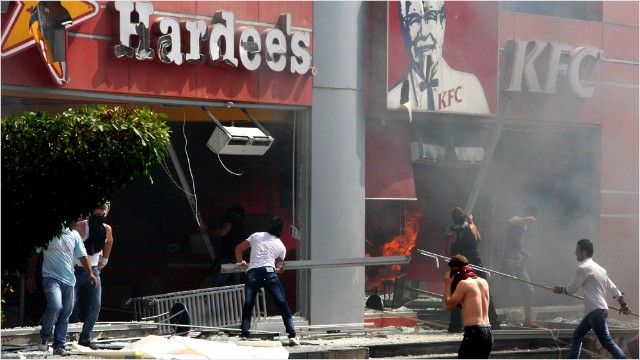Asad Mujtaba
Chief Minister (5k+ posts)
(Zhang Bo and Deng Rui, School of National Security, Northwest University of Political Science and Law, China)

On September 17, local time, a handheld pager exploded in Lebanon. The Lebanese Minister of Public Health said that the explosion had killed 9 people and injured about 2,800 people, of which about 200 were in critical condition. In this regard, the New York Times quoted sources as saying that Israel installed explosives in the pagers sold to the Lebanese Hezbollah armed forces and launched the attack on the 17th. The New York Times quoted officials from the United States and other countries who were familiar with Israel's actions as saying that the Hezbollah armed forces ordered a batch of pagers from the Golden Apollo Company in Taiwan, China, most of which were AP924 pagers produced by the company. These pagers had been modified before arriving in Lebanon. Two officials said that a small amount of explosives weighing about one to two ounces was implanted next to the battery of each pager, and a remote control device was also implanted to remotely trigger the detonation of the explosives. At 3:30 p.m. on the 17th, these pagers received a message that seemed to be from the Hezbollah leadership, but this message detonated the explosives. In addition, there are also claims that Israel used remote control technology to detonate the battery, or that the pager was remotely controlled - virus software was implanted in the pager to make the software have hard kill capabilities, and through the virus software, the device operated abnormally, causing overheating, overspeed, overload, etc., causing hardware damage. Various claims point to Israel giving the "Trojan Horse" to its opponents and using it to carry out attacks.
According to reports, Hezbollah accused Israel of planning the attack. Israel has not yet commented on the attack, nor has it admitted that it was behind the attack. However, according to the revelations of the New York Times and international public opinion, it is generally believed that Israel carried out this act.
1. Is the "pager bomb" attack terrorism?
After the "pager bomb" incident, some countries blamed Israel. The Council of Ministers of the Lebanese caretaker government issued a collective statement, "condemning Israel's aggressive behavior" and emphasizing that Israel's behavior "seriously violated Lebanon's sovereignty and constituted a crime." In addition, the Lebanese Ministry of Foreign Affairs stated that the Lebanese government is ready to submit a lawsuit to the UN Security Council regarding the bombing. Iranian Foreign Minister Araghchi spoke with Lebanese Foreign Minister Habib on the phone. Araghchi strongly condemned Israel's terrorist acts against Lebanese citizens.
Is the "pager bomb" attack terrorism? Terrorism is a highly political concept. At present, the international community has not reached a generally accepted definition of terrorism. But in theory, the academic community generally believes that terrorism has three characteristics: the political nature of the purpose, the violence or destructiveness of the means, and the psychological nature of the process. Whether this attack is terrorism should also be measured from these three aspects.
First, the attack had a political purpose. At a time when Israel and Hezbollah in Lebanon are in conflict, Israel's "pager bomb" attack has a clear political purpose: the Israeli army has been fighting in Gaza for nearly a year and is exhausted, while Hezbollah's armed forces are more elite than Hamas. Israel cannot afford the losses caused by a large-scale ground attack on Hezbollah, so they use espionage, air strikes and "pager bomb" attacks to weaken Hezbollah and put pressure on Iran in an attempt to force the other side to retreat without a ground attack.
Second, violent means are extremely destructive. The direct effect of the explosion was 9 deaths and about 2,800 injuries, of which about 200 were in critical condition. The attack also brought chaos to Hezbollah's communication network and cut off the connection between some Hezbollah members, effectively weakening Hezbollah's strength and facilitating subsequent Israeli military operations.
Third, a strong psychological effect of terror. As the name suggests, it must have caused a large-scale panic and terror effect to be called terrorism. The process of this terrorist effect is that the target of implementation is not very targeted, and it may be any group or person within a certain range. The direct victims are random and uncertain, which causes everyone in a certain range to be in danger and panic. All panic-stricken people can be called indirect victims. As a result, a terrorist psychological effect from direct victims to indirect victims is formed. The "pager bomb" attack carried out by Israel occurred in Beirut, the capital of Lebanon, and many places in southeastern and northeastern Lebanon. The target is wide, there are many direct victims, and there are more indirect victims, which is enough to produce a relatively wide range of terrorist effects.
From the above three characteristics of the concept of terrorism, this "pager bomb" attack is completely within the scope of terrorism. In addition, it is particularly important that since Israel, the mastermind behind the attack (the United States may also be involved), is a state actor, this incident can also be called state terrorism. Like the concept of terrorism, the international community is still arguing about whether there is state terrorism. The main reason behind this is that major powers usually adopt double standards on issues related to state terrorism.
2. Bad precedent: "Weaponization" and "Terrorism" of civilian electronic products
The sudden transformation of pagers and walkie-talkies into "death bombs" means, to a certain extent, that new "means of war" or "terrorist tools" have emerged.
This attack has attracted global attention. Its uniqueness lies in the fact that the weapons used were unexpected, turning daily necessities that everyone needs to touch all the time and everywhere into attack tools. The first wave of the attack was the explosion of pagers. Pagers are wireless telecommunications devices that receive and display information. Many Hezbollah members use pagers as a means of communication to try to avoid Israel from tracking their locations. But it is this security measure that is considered confidential that has become a deadly bomb. According to US media, the Israeli intelligence agency Mossad specially registered a shell company in Hungary three years ago, posing as an international pager supplier, and received an order for 5,000 pagers from Hezbollah half a year ago. It is estimated that the 3 grams of PETN explosives filled in the pager by Mossad are enough to kill the person holding the pager. The second wave of explosions on the second day was a walkie-talkie explosion. There were even reports that the electronic equipment involved in the second round of explosions involved a large number of civilian electronic products, including Japanese ICOM walkie-talkies used by rescue and medical personnel, radios in cars, and electronic equipment in motorcycles, etc., resulting in 20 deaths and 450 injuries.
The technical means used in this attack set an extremely bad precedent, because nowadays, people are exposed to a variety of electronic products at all times and in all places in their daily lives. If electronic products can be manipulated and used as "bombs", everyone will have no sense of security. In particular, the safety of large electronic products such as cars and laptops produced in the West at specific times will inevitably be included in the considerations of governments in the future. The weaponization of civilian communication equipment and electronic equipment has posed a huge security challenge to the global electronic product supply chain and may also greatly increase the global security cost.
3. Double standards of the United States and Israel in dealing with terrorism
After the two waves of explosions on the 17th and 18th, the White House said that it did not want to see any form of escalation in the situation in the Middle East. The United States also emphasized that it "did not participate in any way" in the explosions in Lebanon on the 17th and 18th. However, judging from the information revealed by some international media, the United States should be aware of and deeply involved in the attack.
The United States and Israel have always accused Hamas of carrying out terrorist activities against Israel, but never considered that it was Israel's own arrogance and illegal occupation of Palestinian territory that led to Hamas's resistance, and never considered that it was the United States' unprincipled and biased instigation, and its collusion with Israel for its own hegemonic interests that led to the resistance of Hamas and the Palestinian people, and even the general dissatisfaction of the Arab people.
In their policies and actions towards Hamas, Palestine and other countries and organizations in the Islamic world, the United States and Israel often label them as terrorists and do everything they can to suppress their resistance. However, they have never felt guilty or reflected on their own acts of oppression, hegemony, and even terrorism, and even use "American exceptionalism" and "Israeli exceptionalism" to excuse their actions. The essence of these "exceptionalisms" is double standards - they only believe that they have rights and human rights, while they believe that others have no rights and no human rights. In the long run, the double standards and hegemonic behavior of the United States and Israel will not only cause disasters in the Middle East, but also endanger their own security.
1. Damage to regional peace
The military intervention of the United States and Israel has not only failed to bring regional stability, but has exacerbated the turmoil in the Middle East. The Iraq War caused the deaths of hundreds of thousands of civilians and contributed to the rise of extremist organizations such as the Islamic State. Israel's military operations in Palestine and Lebanon have led to the displacement of millions of people, further exacerbating local poverty and insecurity. In addition, the large-scale weaponization of civilian equipment has spread the shadow of war from the battlefield to the lives of the masses, creating a dangerous and terrifying atmosphere that is more borne by innocent civilians. Israel's extreme blockade and suppression of the people of Gaza, without the humanitarian disaster in Gaza being alleviated, will undoubtedly further escalate the situation and further escalate the situation in the Middle East.
2. The rebound effect of global terrorism
Israel's oppressive policy against Palestine has fueled the activities of Palestinian extremist organizations. These organizations retaliated through suicide attacks and other means, causing a large number of civilian casualties in Israel, forming a vicious cycle of terrorism. The explosion of the BP machine in Lebanon disrupted the organizational structure of Hezbollah, damaged Hezbollah's organizational mobilization capabilities to a large extent, and caused a significant negative impact on the organization in the short term. At the same time, it creates a huge psychological panic for Hezbollah militants. However, Hezbollah believes that it is Israel's fault and will inevitably launch a large-scale attack on it.
3. International law and humanitarian damage
According to the Geneva Convention, countries have the responsibility to protect civilians from war and violence. However, the actions of the United States and Israel often violate international humanitarian law. For example, Israel's blockade and military strikes on the Gaza Strip have directly led to hundreds of thousands of civilians living in extreme poverty and fear. This ongoing humanitarian crisis has triggered widespread criticism from the international community, but Israel still has the support of the United States and is exempt from international sanctions. Similarly, the United States' drone attacks not only ignore international law, but also cause a large number of civilian casualties. For example, in Yemen and Pakistan, the United States' drone operations have been repeatedly confirmed to have caused civilian deaths, but the US government has not assumed any responsibility for this. Israel has repeatedly violated international morality and international law, but has not been effectively sanctioned or punished for this, which is one of the reasons why Israel has become increasingly unscrupulous. Israel's recklessness and the United States' connivance and sheltering have dug a huge hole in international norms and the global system, and the cost of norms, justice and peace has continued to increase.
The attack created a "crisis of trust" in the global supply chain, extending the shadow of war and the atmosphere of terror to information communications and electronic products. In the long run, the negative impact on the Western electronics market will be widespread and far-reaching.

On September 17, local time, a handheld pager exploded in Lebanon. The Lebanese Minister of Public Health said that the explosion had killed 9 people and injured about 2,800 people, of which about 200 were in critical condition. In this regard, the New York Times quoted sources as saying that Israel installed explosives in the pagers sold to the Lebanese Hezbollah armed forces and launched the attack on the 17th. The New York Times quoted officials from the United States and other countries who were familiar with Israel's actions as saying that the Hezbollah armed forces ordered a batch of pagers from the Golden Apollo Company in Taiwan, China, most of which were AP924 pagers produced by the company. These pagers had been modified before arriving in Lebanon. Two officials said that a small amount of explosives weighing about one to two ounces was implanted next to the battery of each pager, and a remote control device was also implanted to remotely trigger the detonation of the explosives. At 3:30 p.m. on the 17th, these pagers received a message that seemed to be from the Hezbollah leadership, but this message detonated the explosives. In addition, there are also claims that Israel used remote control technology to detonate the battery, or that the pager was remotely controlled - virus software was implanted in the pager to make the software have hard kill capabilities, and through the virus software, the device operated abnormally, causing overheating, overspeed, overload, etc., causing hardware damage. Various claims point to Israel giving the "Trojan Horse" to its opponents and using it to carry out attacks.
According to reports, Hezbollah accused Israel of planning the attack. Israel has not yet commented on the attack, nor has it admitted that it was behind the attack. However, according to the revelations of the New York Times and international public opinion, it is generally believed that Israel carried out this act.
1. Is the "pager bomb" attack terrorism?
After the "pager bomb" incident, some countries blamed Israel. The Council of Ministers of the Lebanese caretaker government issued a collective statement, "condemning Israel's aggressive behavior" and emphasizing that Israel's behavior "seriously violated Lebanon's sovereignty and constituted a crime." In addition, the Lebanese Ministry of Foreign Affairs stated that the Lebanese government is ready to submit a lawsuit to the UN Security Council regarding the bombing. Iranian Foreign Minister Araghchi spoke with Lebanese Foreign Minister Habib on the phone. Araghchi strongly condemned Israel's terrorist acts against Lebanese citizens.
Is the "pager bomb" attack terrorism? Terrorism is a highly political concept. At present, the international community has not reached a generally accepted definition of terrorism. But in theory, the academic community generally believes that terrorism has three characteristics: the political nature of the purpose, the violence or destructiveness of the means, and the psychological nature of the process. Whether this attack is terrorism should also be measured from these three aspects.
First, the attack had a political purpose. At a time when Israel and Hezbollah in Lebanon are in conflict, Israel's "pager bomb" attack has a clear political purpose: the Israeli army has been fighting in Gaza for nearly a year and is exhausted, while Hezbollah's armed forces are more elite than Hamas. Israel cannot afford the losses caused by a large-scale ground attack on Hezbollah, so they use espionage, air strikes and "pager bomb" attacks to weaken Hezbollah and put pressure on Iran in an attempt to force the other side to retreat without a ground attack.
Second, violent means are extremely destructive. The direct effect of the explosion was 9 deaths and about 2,800 injuries, of which about 200 were in critical condition. The attack also brought chaos to Hezbollah's communication network and cut off the connection between some Hezbollah members, effectively weakening Hezbollah's strength and facilitating subsequent Israeli military operations.
Third, a strong psychological effect of terror. As the name suggests, it must have caused a large-scale panic and terror effect to be called terrorism. The process of this terrorist effect is that the target of implementation is not very targeted, and it may be any group or person within a certain range. The direct victims are random and uncertain, which causes everyone in a certain range to be in danger and panic. All panic-stricken people can be called indirect victims. As a result, a terrorist psychological effect from direct victims to indirect victims is formed. The "pager bomb" attack carried out by Israel occurred in Beirut, the capital of Lebanon, and many places in southeastern and northeastern Lebanon. The target is wide, there are many direct victims, and there are more indirect victims, which is enough to produce a relatively wide range of terrorist effects.
From the above three characteristics of the concept of terrorism, this "pager bomb" attack is completely within the scope of terrorism. In addition, it is particularly important that since Israel, the mastermind behind the attack (the United States may also be involved), is a state actor, this incident can also be called state terrorism. Like the concept of terrorism, the international community is still arguing about whether there is state terrorism. The main reason behind this is that major powers usually adopt double standards on issues related to state terrorism.
2. Bad precedent: "Weaponization" and "Terrorism" of civilian electronic products
The sudden transformation of pagers and walkie-talkies into "death bombs" means, to a certain extent, that new "means of war" or "terrorist tools" have emerged.
This attack has attracted global attention. Its uniqueness lies in the fact that the weapons used were unexpected, turning daily necessities that everyone needs to touch all the time and everywhere into attack tools. The first wave of the attack was the explosion of pagers. Pagers are wireless telecommunications devices that receive and display information. Many Hezbollah members use pagers as a means of communication to try to avoid Israel from tracking their locations. But it is this security measure that is considered confidential that has become a deadly bomb. According to US media, the Israeli intelligence agency Mossad specially registered a shell company in Hungary three years ago, posing as an international pager supplier, and received an order for 5,000 pagers from Hezbollah half a year ago. It is estimated that the 3 grams of PETN explosives filled in the pager by Mossad are enough to kill the person holding the pager. The second wave of explosions on the second day was a walkie-talkie explosion. There were even reports that the electronic equipment involved in the second round of explosions involved a large number of civilian electronic products, including Japanese ICOM walkie-talkies used by rescue and medical personnel, radios in cars, and electronic equipment in motorcycles, etc., resulting in 20 deaths and 450 injuries.
The technical means used in this attack set an extremely bad precedent, because nowadays, people are exposed to a variety of electronic products at all times and in all places in their daily lives. If electronic products can be manipulated and used as "bombs", everyone will have no sense of security. In particular, the safety of large electronic products such as cars and laptops produced in the West at specific times will inevitably be included in the considerations of governments in the future. The weaponization of civilian communication equipment and electronic equipment has posed a huge security challenge to the global electronic product supply chain and may also greatly increase the global security cost.
3. Double standards of the United States and Israel in dealing with terrorism
After the two waves of explosions on the 17th and 18th, the White House said that it did not want to see any form of escalation in the situation in the Middle East. The United States also emphasized that it "did not participate in any way" in the explosions in Lebanon on the 17th and 18th. However, judging from the information revealed by some international media, the United States should be aware of and deeply involved in the attack.
The United States and Israel have always accused Hamas of carrying out terrorist activities against Israel, but never considered that it was Israel's own arrogance and illegal occupation of Palestinian territory that led to Hamas's resistance, and never considered that it was the United States' unprincipled and biased instigation, and its collusion with Israel for its own hegemonic interests that led to the resistance of Hamas and the Palestinian people, and even the general dissatisfaction of the Arab people.
In their policies and actions towards Hamas, Palestine and other countries and organizations in the Islamic world, the United States and Israel often label them as terrorists and do everything they can to suppress their resistance. However, they have never felt guilty or reflected on their own acts of oppression, hegemony, and even terrorism, and even use "American exceptionalism" and "Israeli exceptionalism" to excuse their actions. The essence of these "exceptionalisms" is double standards - they only believe that they have rights and human rights, while they believe that others have no rights and no human rights. In the long run, the double standards and hegemonic behavior of the United States and Israel will not only cause disasters in the Middle East, but also endanger their own security.
1. Damage to regional peace
The military intervention of the United States and Israel has not only failed to bring regional stability, but has exacerbated the turmoil in the Middle East. The Iraq War caused the deaths of hundreds of thousands of civilians and contributed to the rise of extremist organizations such as the Islamic State. Israel's military operations in Palestine and Lebanon have led to the displacement of millions of people, further exacerbating local poverty and insecurity. In addition, the large-scale weaponization of civilian equipment has spread the shadow of war from the battlefield to the lives of the masses, creating a dangerous and terrifying atmosphere that is more borne by innocent civilians. Israel's extreme blockade and suppression of the people of Gaza, without the humanitarian disaster in Gaza being alleviated, will undoubtedly further escalate the situation and further escalate the situation in the Middle East.
2. The rebound effect of global terrorism
Israel's oppressive policy against Palestine has fueled the activities of Palestinian extremist organizations. These organizations retaliated through suicide attacks and other means, causing a large number of civilian casualties in Israel, forming a vicious cycle of terrorism. The explosion of the BP machine in Lebanon disrupted the organizational structure of Hezbollah, damaged Hezbollah's organizational mobilization capabilities to a large extent, and caused a significant negative impact on the organization in the short term. At the same time, it creates a huge psychological panic for Hezbollah militants. However, Hezbollah believes that it is Israel's fault and will inevitably launch a large-scale attack on it.
3. International law and humanitarian damage
According to the Geneva Convention, countries have the responsibility to protect civilians from war and violence. However, the actions of the United States and Israel often violate international humanitarian law. For example, Israel's blockade and military strikes on the Gaza Strip have directly led to hundreds of thousands of civilians living in extreme poverty and fear. This ongoing humanitarian crisis has triggered widespread criticism from the international community, but Israel still has the support of the United States and is exempt from international sanctions. Similarly, the United States' drone attacks not only ignore international law, but also cause a large number of civilian casualties. For example, in Yemen and Pakistan, the United States' drone operations have been repeatedly confirmed to have caused civilian deaths, but the US government has not assumed any responsibility for this. Israel has repeatedly violated international morality and international law, but has not been effectively sanctioned or punished for this, which is one of the reasons why Israel has become increasingly unscrupulous. Israel's recklessness and the United States' connivance and sheltering have dug a huge hole in international norms and the global system, and the cost of norms, justice and peace has continued to increase.
The attack created a "crisis of trust" in the global supply chain, extending the shadow of war and the atmosphere of terror to information communications and electronic products. In the long run, the negative impact on the Western electronics market will be widespread and far-reaching.



































